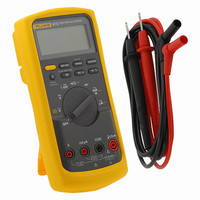FLUKE-87-5 Fluke Electronics, FLUKE-87-5 Datasheet - Page 21

FLUKE-87-5
Manufacturer Part Number
FLUKE-87-5
Description
DMM INDUSTRIAL TRUE-RMS W/TEMP
Manufacturer
Fluke Electronics
Series
8xr
Type
Digital (DMM)r
Specifications of FLUKE-87-5
Includes
Battery, Clips, Temperature Probe, Test Leads
Style
Handheld
Display Digits
4.5
Display Type
LCD, Bar Graph
Display Count
20000
Function
Voltage, Current, Resistance, Capacitance, Temperature, Frequency
Functions, Extra
Continuity, Diode Test
Features
Auto Off, Backlight, Clips, Hold, Min/Max/Ave
Ranging
Auto/Manual
Response
True RMS
Lead Free Status / RoHS Status
Vendor undefined / RoHS compliant by exemption
Other names
2074974
614-1042
87 V
87-5
87-V
FLUKE 87 V
FLUKE-87-V
614-1042
87 V
87-5
87-V
FLUKE 87 V
FLUKE-87-V
Power-Up Options
Holding a button down while turning the Meter on activates
a power-up option. Table 4 includes the power-up options.
Automatic Power-Off
The Meter automatically turns off if you do not turn the
rotary switch or press a button for 30 minutes. If MIN MAX
Recording is enabled, the Meter will not power off. To
disable automatic power-off, refer to Table 4.
Input Alert Feature
If a test lead is plugged into the mA/ A or A terminal, but
the rotary switch is not set to the correct current position,
the beeper warns you by making a chirping sound and the
display flashes “LEAd”. This warning is intended to stop
you from attempting to measure voltage, continuity,
resistance, capacitance, or diode values when the leads
are plugged into a current terminal.
Making Measurements
The following sections describe how to take
measurements with the Meter.
Measuring AC and DC Voltage
Model 87 features true rms readings, which are accurate
for distorted sine waves and other waveforms (with no dc
offset) such as square waves, triangle waves, and
staircase waves.
The Meter's voltage ranges are 600.0 mV, 6.000 V,
60.00 V, 600.0 V, and 1000 V. To select the 600.0 mV dc
range, turn the rotary switch to mV.
To measure ac or dc voltage, refer to Figure 2.
Placing the probes across (in parallel with) a
powered circuit when a lead is plugged into a
current terminal can damage the circuit you
are testing and blow the Meter's fuse. This
can happen because the resistance through
the Meter's current terminals is very low, so
the Meter acts like a short circuit.
W Caution
Making Measurements
13










